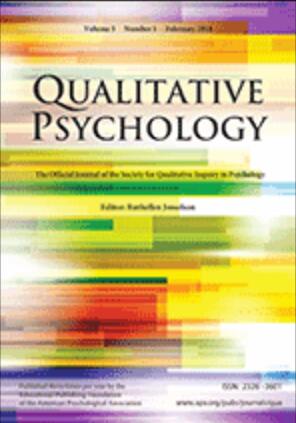Introduction to Special Section: Using Personal Documentary Sources in Psychological Research 1940–1970
IF 14.3
Q2 Psychology
引用次数: 0
Abstract
This Special Section of Qualitative Psychology owes its origin to the comments of Fred Wertz in two forums. The first were his remarks at the opening session on “Qualitative Inquiry in Psychology Past, Present and Future” at the 1st Conference of the Society for Qualitative Inquiry in Psychology held on November 14, 2013 at the Graduate Center, CUNY. There Fred briefly summarized the historical roots of qualitative inquiry in psychology. His remarks later appeared in more extended form (Wertz, 2014) as the very first article in the first issue of this journal. His effort to provide an overview of the past in qualitative research is both modest in scope and, of necessity, limited in depth since, he argues, “despite the importance and ubiquity of qualitative inquiry, a comprehensive account of its history in psychology has not been written” (Wertz, 2014, Abstract). Indeed, only a restricted number of previous and partial historiographic studies of qualitative research in psychology have been published, for example, Giorgi, 2009; Morawski, 2011; Wertz, 2011. Erickson’s (2018) survey of the history of qualitative research in the most recent edition of the authoritative Sage Handbook of Qualitative Research fails to focus upon its application in any psychological domain. And, the parallel Sage Handbook of Qualitative Research in Psychology (Willig & Stainton Rogers, 2017) offers no historical overview of how qualitative inquiry emerged in the discipline. So, in trying to understand the origins and foundations of qualitative practices in psychology, we are faced with limited resources. In both his 2013 talk and 2014 article, Wertz indicated that the publication of Gordon Allport’s, 1942 monograph, The Use of Personal Documents in Psychological Science (UPD), was a crucial landmark, one which served as a “prophetic” call for proper qualitative methodology that was justifiably scientific. “[Allport] asserted that the study of personal documents is indispensible to knowledge of subjective personal life and provides scientific psychology with a touchstone of reality by means of a genuine scientific method” (Wertz, 2014, p. 8). Since I had previously done unpublished archival work on the development of the UPD, I discussed with both Wertz and Ruthellen Josselson, this journal’s editor, the possibility of developing a special section which might deepen the historiography of personal documents in psychological research including Allport’s (1942) own effort. Further, as Wertz (2014) noted “even after (Allport’s, 1942) call, almost 30 years passed before concerted efforts were undertaken to formulate general qualitative methodologies for psychology” (p. 5). Would it be possible to offer some greater insight or detail about how personal documentary data were approached or weighted in the period from roughly the early 1940s until about 1970? Josselson suggested as well that the dearth专题导论:在心理学研究中使用个人文献资料1940-1970
质性心理学的这个特别部分的起源要归功于Fred Wertz在两个论坛上的评论。第一次是2013年11月14日在纽约市立大学研究生中心举行的第一届心理学质性探究学会会议“心理学的过去、现在和未来的质性探究”开幕式上的发言。弗雷德简要地总结了心理学中定性探究的历史根源。他的评论后来以更广泛的形式出现(Wertz, 2014),作为本刊第一期的第一篇文章。他对过去定性研究的概述在范围和深度上都是有限的,因为他认为,“尽管定性研究的重要性和普遍性,但对其在心理学中的历史的全面描述还没有被写出来”(Wertz, 2014,摘要)。事实上,只有数量有限的先前和部分心理学定性研究的史学研究已经发表,例如,Giorgi, 2009;Morawski, 2011;Wertz, 2011年。Erickson(2018)在权威的Sage定性研究手册的最新版本中对定性研究的历史进行了调查,但没有关注其在任何心理学领域的应用。而且,与之平行的《心理学定性研究圣人手册》(willg & Stainton Rogers, 2017)没有提供关于该学科如何出现定性调查的历史概述。因此,在试图理解心理学定性实践的起源和基础时,我们面临着资源有限的问题。在2013年的演讲和2014年的文章中,Wertz指出,Gordon Allport于1942年出版的专著《个人文件在心理科学中的使用》(the Use of Personal Documents In Psychological Science,简称UPD)是一个重要的里程碑,它“预言性”地呼吁采用合理的科学定性方法。“[Allport]断言,对个人文件的研究对于了解主观个人生活是不可或缺的,并通过真正的科学方法为科学心理学提供了现实的试金石”(Wertz, 2014, p. 8)。由于我之前做过关于UPD发展的未发表的档案工作,我与Wertz和该杂志的编辑Ruthellen Josselson讨论过,发展一个特殊部分的可能性,这可能会加深心理学研究中个人文件的历史编纂,包括奥尔波特(1942)自己的努力。此外,正如Wertz(2014)所指出的,“即使在(Allport’s, 1942)呼吁之后,近30年过去了,人们才开始共同努力,制定心理学的一般定性方法”(第5页)。是否有可能提供一些更深入的见解或细节,说明从大约20世纪40年代初到1970年左右,个人文献数据是如何处理或加权的?Josselson也提出了这个问题
本文章由计算机程序翻译,如有差异,请以英文原文为准。
求助全文
约1分钟内获得全文
求助全文
来源期刊

Qualitative Psychology
Psychology-Psychology (all)
CiteScore
7.80
自引率
0.00%
发文量
15
期刊介绍:
The mission of Qualitative Psychology journal is to foster innovative methods, theories, and empirical research in qualitative inquiry within psychology. The journal aims to highlight the unique contributions of qualitative research in advancing psychological knowledge. Published studies not only explore substantive topics but also address issues related to epistemology, the philosophy of science, and methodological criteria that impact the formulation, execution, and interpretation of qualitative research.
Qualitative Psychology promotes a diverse range of methodological approaches, including narrative, discourse analysis, life history, phenomenology, ethnography, action research, and case study. Additionally, the journal puts emphasis on discussing the teaching and training of qualitative research methods to develop competent qualitative researchers.
 求助内容:
求助内容: 应助结果提醒方式:
应助结果提醒方式:


